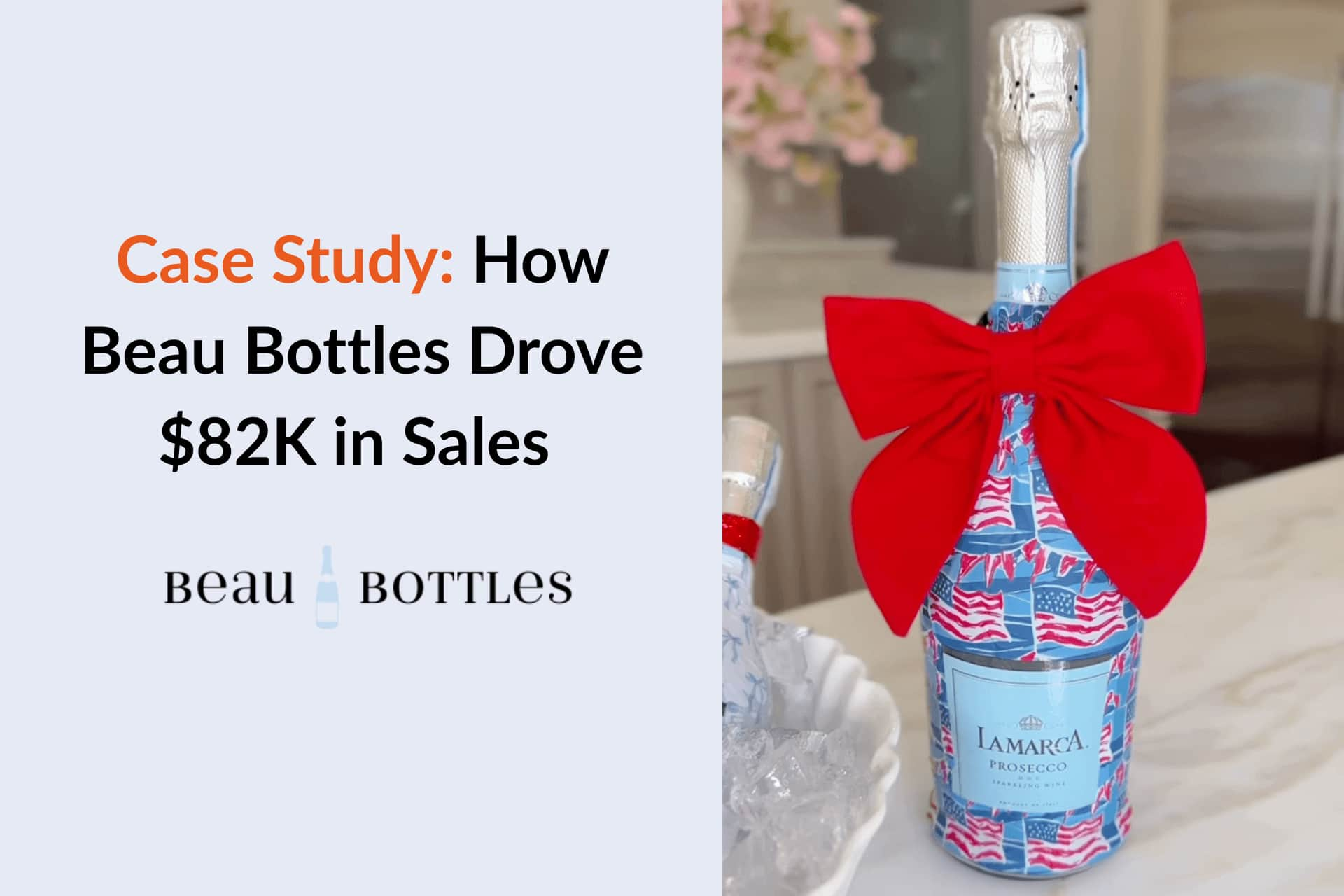





Influentials offers a cost-effective solution for brands and agencies seeking verified creators, campaign management, built-in payments, and multi-platform support. However, some teams may encounter limits in global creator reach, advanced analytics, AI-assisted targeting, or enterprise-grade workflow automation.
In this guide, we’ll explore the leading Influentials alternatives, offering detailed comparisons of features, usability, and pricing. This analysis helps you determine which platform best aligns with your brand’s campaign goals, team size, marketing budget, and growth strategy.
Top 10 Influentials Alternatives
While Influentials delivers a cost-effective way to launch UGC and influencer campaigns with verified creators, it may not fit every brand or agency’s needs. Some users point out limitations in reporting, creator pool size, and service fees, leading them to consider alternative platforms.
Influentials applies a 10–19% service fee on influencer payouts depending on the plan. For brands running frequent or large-scale campaigns, these fees can quickly add up and make the platform less economical over time.
Although the platform provides valuable insights into influencer demographics and engagement, its analytics tools are not as advanced as enterprise-level competitors. Teams needing in-depth competitor benchmarking or real-time optimization may find the data insufficient for complex strategies.
Influentials’ network of 10,000+ verified creators ensures authenticity, but it’s smaller compared to global platforms with hundreds of thousands of influencers. This narrower selection can limit campaign diversity and scalability, especially for international brands targeting multiple markets.
Influentials has strong traction in Europe, particularly in markets like the Netherlands, but its reach is more limited globally. Brands seeking to expand across North America, Asia, or Latin America may find the creator pool less diverse compared to larger international platforms.
To compare the different platforms, we focused on central criteria that all must meet:
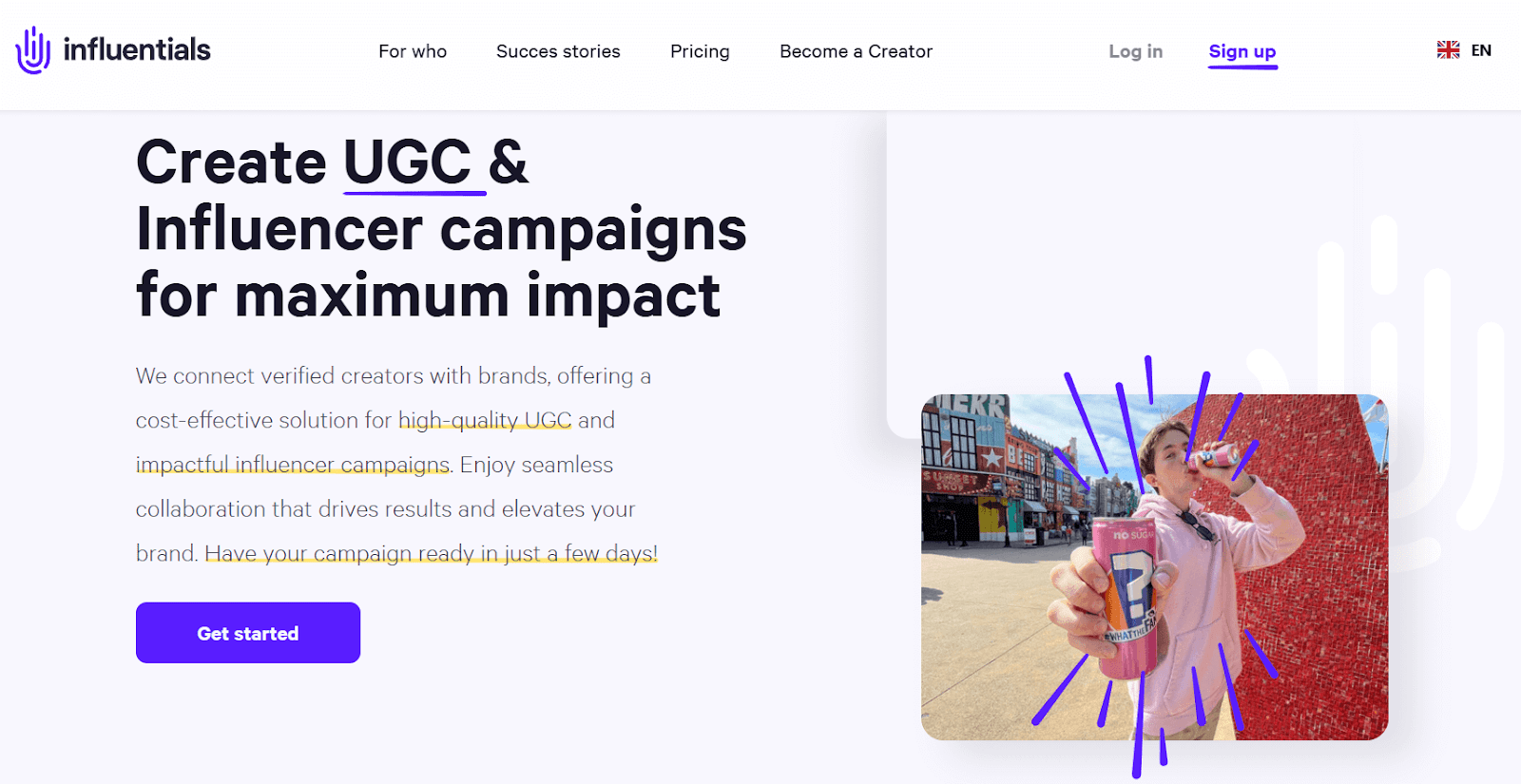
Platform Coverage: Influentials connects brands and agencies with over 10,000 verified creators across Instagram, TikTok, YouTube, and Facebook, specializing in UGC and influencer collaborations.
Best For: Brands and agencies looking for a cost-effective, end-to-end solution for UGC creation and influencer marketing campaigns, with easy payments, transparent creator data, and streamlined campaign management.
Pricing: Influentials offers three pricing options.
Per Campaign Plan – €299 per campaign
Single Brand Plan – €349 per month
Multi Brand Plan – €649 per month
Free Trial – included with all plans
Review: 4.0/5.0 (Capterra)
Ease of Use (UX/UI): Users praise Influentials for its Campaign Wizard and simple collaboration tools, making it easy to scale UGC campaigns. However, some reviews mention that reporting features are less advanced compared to higher-priced competitors.
Customer Support: Influentials provides 24/7 support via live chat, email, and phone, along with a dedicated account manager on monthly plans.
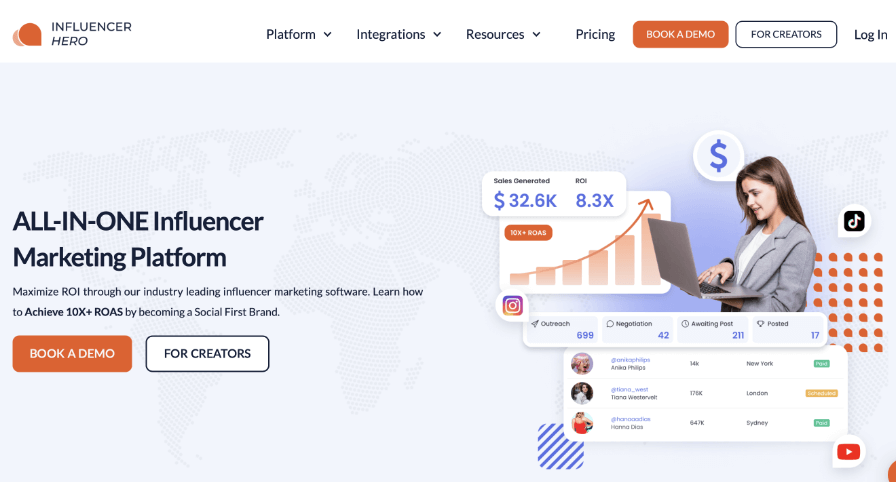
Platform Coverage: Influencer Hero supports influencer marketing across Instagram, TikTok, YouTube, Facebook, Pinterest, Snapchat, X (Twitter), and Twitch.
Best For: Influencer Hero is best for fast-scaling DTC brands and eCommerce businesses on Shopify, WooCommerce, or custom setups looking to run high-volume influencer, affiliate, and UGC campaigns from a single dashboard.
Pricing: Influencer Hero offers flexible monthly plans:
Reviews: 5.0 / 5.0 on Capterra
Ease of Use (UX/UI): Campaign flows are visually structured, with ready-made templates that guide even new users through setup and execution. Advanced teams benefit from granular workflow control without losing overall simplicity.
Customer Support: Every client receives personalized help, including account managers at all tiers and Slack communication for Pro and Business. Support operates 24/7 across chat, email, and an extensive knowledge base.
Influentials offers three pricing tiers, from €299/campaign to €649/month for multiple brands, while Influencer Hero starts at $649/month for Standard and $2,490/month for Business, making Influencer Hero more expensive but offering broader integrations. Influentials provides a verified creator network of over 10,000 pre-screened influencers, while Influencer Hero also includes Shopify and WooCommerce integrations for automated affiliate and gifting tracking.
Campaign setup is simplified in Influentials through the Campaign Wizard, helping teams scale quickly with step-by-step guidance, whereas Influencer Hero provides more advanced workflow automation for larger teams, with the assistance of an account manager.
Multi-platform management is strong on both platforms, but Influencer Hero offers extended features like pre-made templates and browser extensions to enhance discovery and content reuse. Both platforms provide built-in payments and secure contracts, though Influencer Hero emphasizes enterprise-level campaign management.
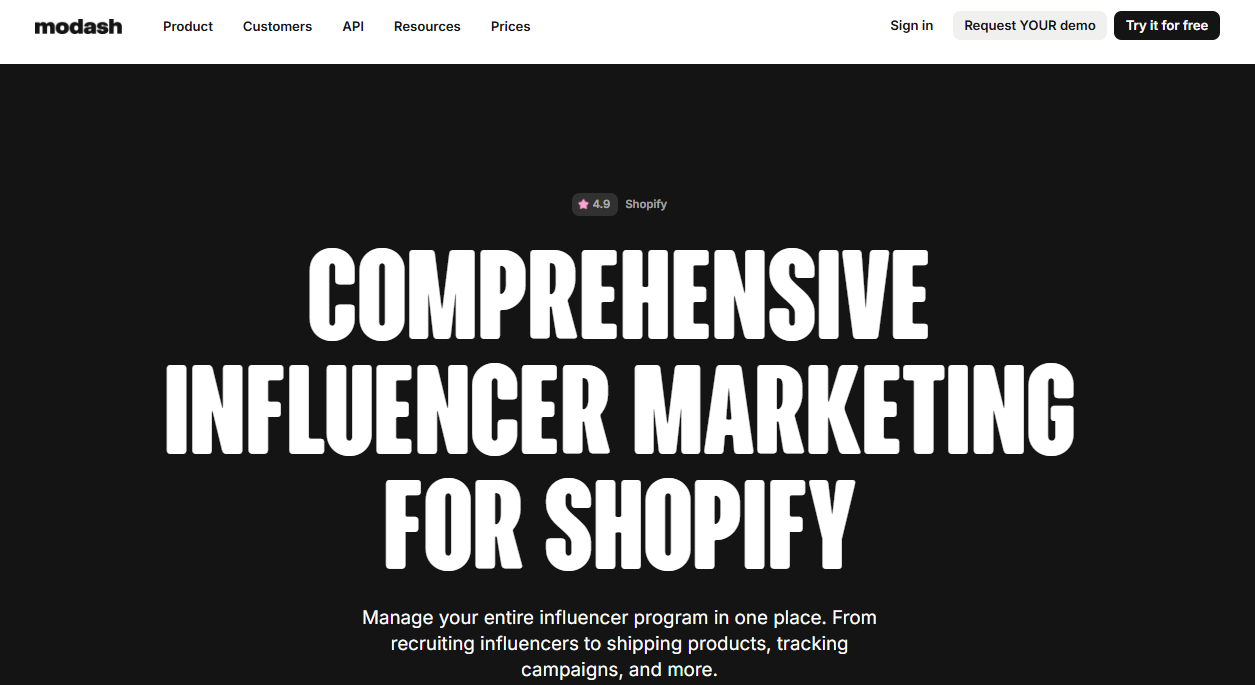
Platform coverage: Instagram, YouTube and TikTok. Limited functionality for influencers from Snapchat and X.
Pricing: Modash pricing starts at $199 per month. They also offer a medium tier plan fixed at a $499 rate. The enterprise level plan has custom pricing.
Reviews: 4.9/5.0 (Capterra)
Ease of Use (UX/UI): Modash offers a streamlined layout built for quick influencer discovery. Filters respond instantly, making campaign setup smooth with minimal onboarding.
Customer Support: All customers get email support, while premium tiers include live chat and priority responses. Tutorials and a detailed help center simplify the learning process.
Modash plans start at $199/month, with a medium tier at $499/month, which is comparable to Influentials’ multi-brand plan at €649/month. Both platforms offer influencer discovery across Instagram, TikTok, and YouTube, but Modash provides a CRM and structured outreach pipelines.
Audience insights differ: Influentials gives engagement and demographic data for six months, supporting validation of creator fit, whereas Modash emphasizes authenticity screening and moderate analytics for campaign decision-making. Pricing-wise, Influentials’ plans include a free trial, making it easier for small brands to test campaigns, while Modash requires paid subscription tiers to access advanced features.
Overall, Influentials is more campaign execution–oriented with a simpler UI, whereas Modash provides more control over outreach automation and follower verification. Brands looking for cost-effective UGC campaigns may favor Influentials, while teams emphasizing influencer vetting and pipeline management might lean toward Modash.

Platform coverage: Upfluence covers Instagram, TikTok, YouTube, X, Twitch, Pinterest, and WordPress blogs.
Pricing:
Reviews: 4.6/5.0 (G2)
Best For: E-commerce brands and agencies looking to scale YouTube influencer outreach and track ROI.
Ease of Use (UX/UI): Designed for large-scale influencer marketing, the platform has a comprehensive dashboard that requires some learning but allows full workflow management once familiar. Teams benefit from a highly structured environment that keeps campaign execution organized.
Customer Support: Upfluence offers onboarding sessions and dedicated account managers for higher tiers. Email and live chat support ensure marketers have guidance to ramp up campaigns efficiently.
Upfluence pricing starts at $399/month for gifting-only campaigns and $1,276/month for the standard plan, compared to Influentials’ €299–€649/month range. Both platforms support multi-channel influencer marketing, but Upfluence offers a huge creator pool across Instagram, TikTok, YouTube, X, Twitch, Pinterest, and blogs, while Influentials focuses on 10,000+ verified creators.
Campaign workflows differ: Influentials uses the Campaign Wizard for simplified setup and built-in payments, while Upfluence centralizes contracts, outreach, and reporting but requires more setup time. Influentials provides 24/7 support and easy multi-platform management, whereas Upfluence emphasizes real-time dashboards and detailed affiliate tracking for larger campaigns.
For pricing and accessibility, Influentials allows smaller brands to test campaigns with lower upfront investment, whereas Upfluence targets larger e-commerce teams needing deep analytics and workflow centralization. Both platforms are robust, but Influentials is easier for lean teams, while Upfluence suits organizations managing large-scale campaigns.
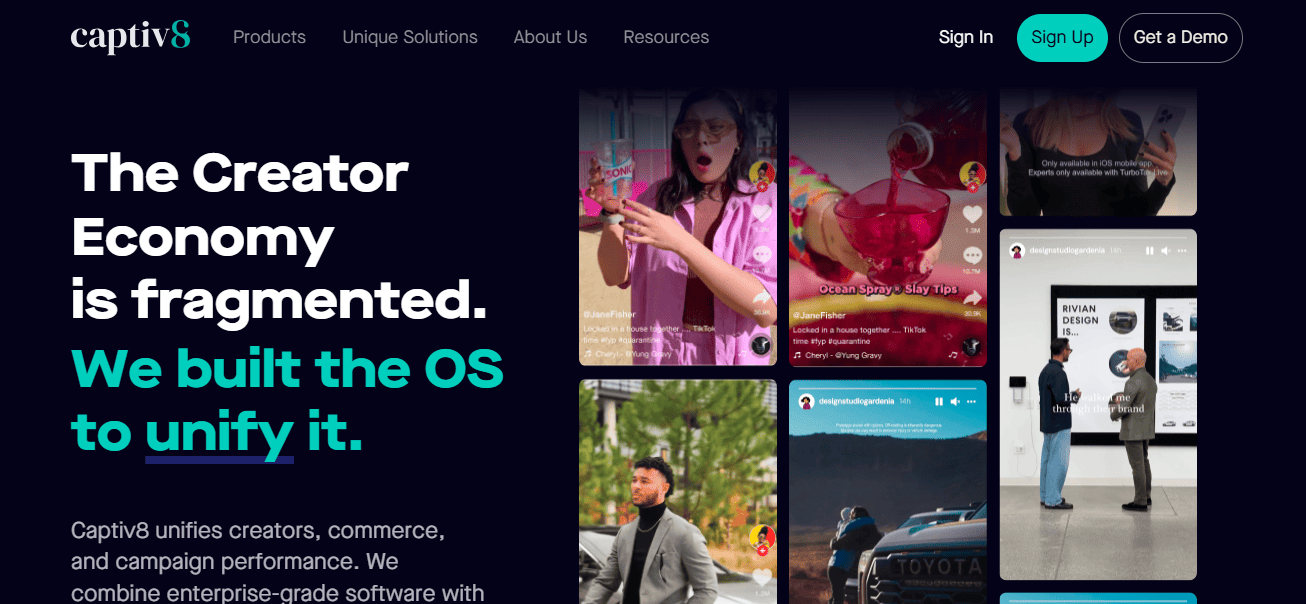
Platform coverage: Captiv8 covers Instagram, TikTok, Facebook, YouTube, X (formerly Twitter) and Twitch.
Pricing: $25.000 Annually (Annual commitment needed). Plus a $3.000 onboarding fee.
Reviews: 4.5/5.0 (G2)
Best for: Brands and agencies running large-scale influencer campaigns in platforms like Instagram, TikTok and YouTube.
Ease of Use (UX/UI): Captiv8 provides advanced tools tailored for experienced marketers, but first-time users may need extra time to navigate the platform. Its design supports large-scale campaigns with detailed analytics and multi-team collaboration.
Customer Support: Offers dedicated onboarding, campaign guidance, and account managers. Some users report slower response times for urgent billing or technical queries.
Captiv8 costs $25,000/year plus a $3,000 onboarding fee, which is significantly higher than Influentials’ €299–€649/month plans. Both platforms cover Instagram, TikTok, YouTube, and X, but Captiv8 focuses on large-scale campaigns with role-specific permissions and collaborative dashboards, whereas Influentials emphasizes simplicity and fast campaign setup.
Influentials provides 24/7 support and built-in payments for smaller to mid-sized brands, while Captiv8 offers dedicated onboarding and campaign guidance for enterprise clients but may have slower response times. Audience analytics are detailed on both platforms, but Captiv8’s custom dashboards cater to experienced marketers, while Influentials delivers six months of engagement insights to validate creators quickly.
Brands with limited budgets will likely find Influentials more accessible, while Captiv8 is tailored for teams running multi-platform campaigns at scale. Influentials excels at simplicity and cost-effectiveness, whereas Captiv8 is better suited for enterprise-level management and reporting needs.
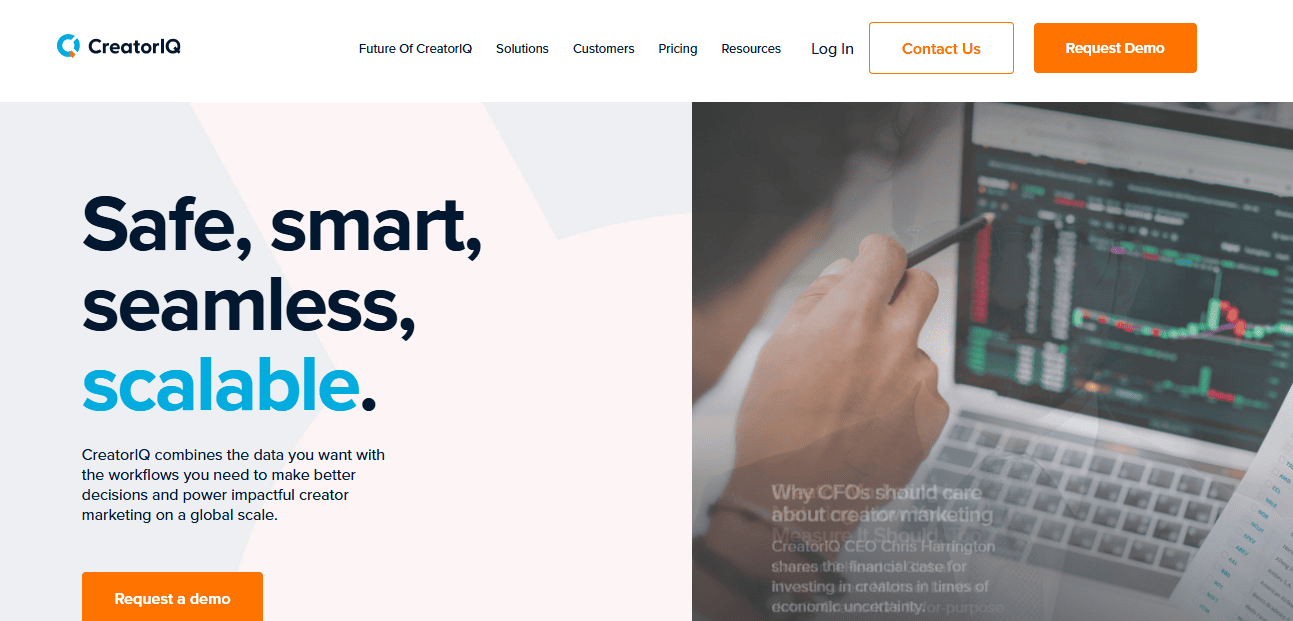
Platform Coverage: CreatorIQ supports Instagram, TikTok, YouTube, Facebook, Pinterest, Twitch, and X (Twitter).
Pricing: CreatorIQ pricing is divided into 4 tiers:
An optional “Creator Connect” feature available for an additional $15,000 per yea
Reviews: 4.6/5.0 (G2)
Best For: Large-scale brands that require robust data controls, customizable workflows, and in-depth influencer analytics across international markets.
Ease of Use (UX/UI): CreatorIQ provides a polished interface aimed at enterprise teams handling multiple influencer programs simultaneously. Its workflow tools and automation options help reduce repetitive setup, though navigating the vast feature set requires practice.
Customer Support: Each client receives a dedicated account manager and ongoing strategy consultations. Global teams benefit from support that ensures campaigns consistently achieve performance targets.
CreatorIQ starts at $35,000/year for the Basic plan, far above Influentials’ €299–€649/month pricing. Both platforms offer multi-channel influencer campaigns, but CreatorIQ focuses on enterprise-scale programs with API accessibility and global payment management, while Influentials is designed for cost-effective, hands-on campaign management.
Influentials’ Campaign Wizard simplifies setup and supports built-in payments, whereas CreatorIQ automates workflows like approvals and tagging but requires significant onboarding to use effectively. Influentials provides real-time support and a verified network of 10,000 creators, while CreatorIQ emphasizes comprehensive analytics, fraud detection, and CRM integration for long-term influencer management.
Overall, Influentials is ideal for small to mid-sized brands seeking an accessible, end-to-end solution, whereas CreatorIQ caters to global enterprises requiring advanced workflows, data depth, and robust scale. Pricing and accessibility clearly favor Influentials for lean teams.
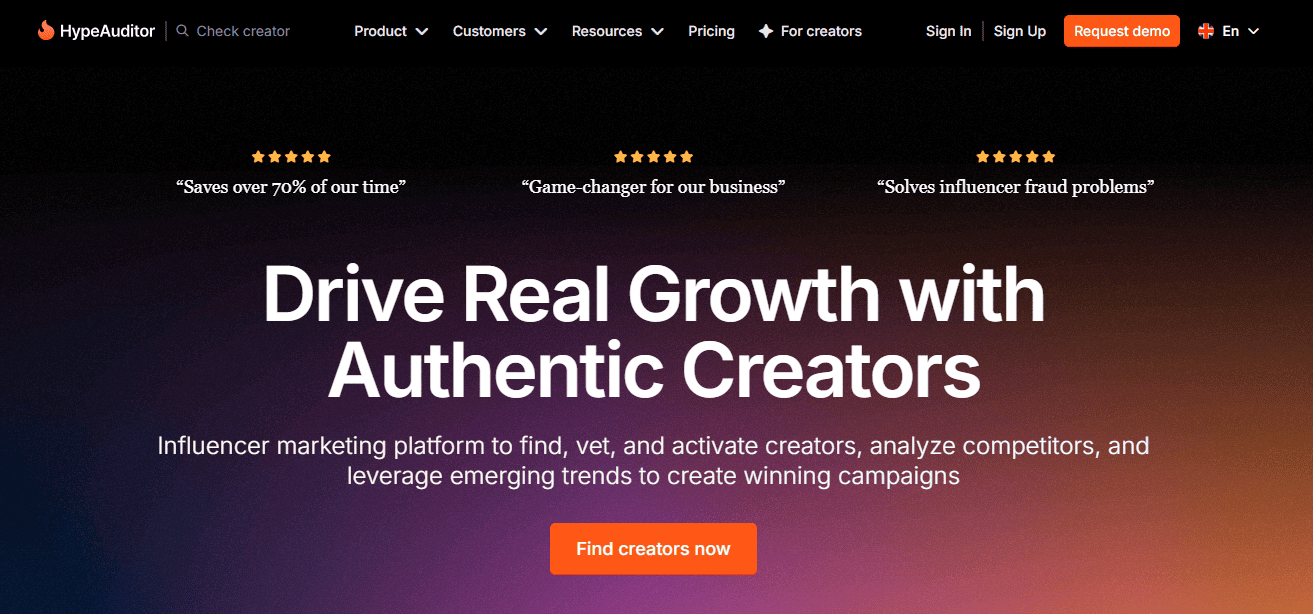
Platform Coverage: HypeAuditor supports Instagram, TikTok, YouTube, Twitch, X (Twitter), and Snapchat.
Pricing: Flexible usage-based pricing, with Business plans starting at around $10,000/year and Enterprise reaching up to $60,000/year.
Reviews: 4.6/5.0 (G2)
Best For: Teams that prioritize data accuracy, detecting fraudulent activity, and benchmarking competitors across various influencer platforms.
Ease of Use (UX/UI): HypeAuditor offers a sleek, analytics-focused interface designed for performance insights. Some tools require practice to unlock the full potential of the platform’s advanced metrics.
Customer Support: Teams can access onboarding support, live chat, and email assistance alongside an extensive knowledge base. This ensures campaigns are activated efficiently and data questions are resolved quickly.
HypeAuditor plans start at $10,000/year, substantially higher than Influentials’ €299–€649/month pricing. Both platforms emphasize authentic influencers, but HypeAuditor focuses on AI-driven fraud detection and benchmarking competitor campaigns, whereas Influentials prioritizes streamlined UGC campaign creation with verified creators.
Influentials offers multi-platform campaign management and built-in payments, while HypeAuditor is more analytics-focused with deep audience insights and technical reporting tools. Campaign execution is simpler on Influentials, while HypeAuditor is suited for teams needing detailed performance metrics and fraud protection.
Brands seeking affordable, ready-to-launch influencer campaigns may prefer Influentials, while teams prioritizing data-driven verification and competitive benchmarking might lean toward HypeAuditor. The pricing gap is notable for small to mid-sized brands considering usability versus analytical depth.
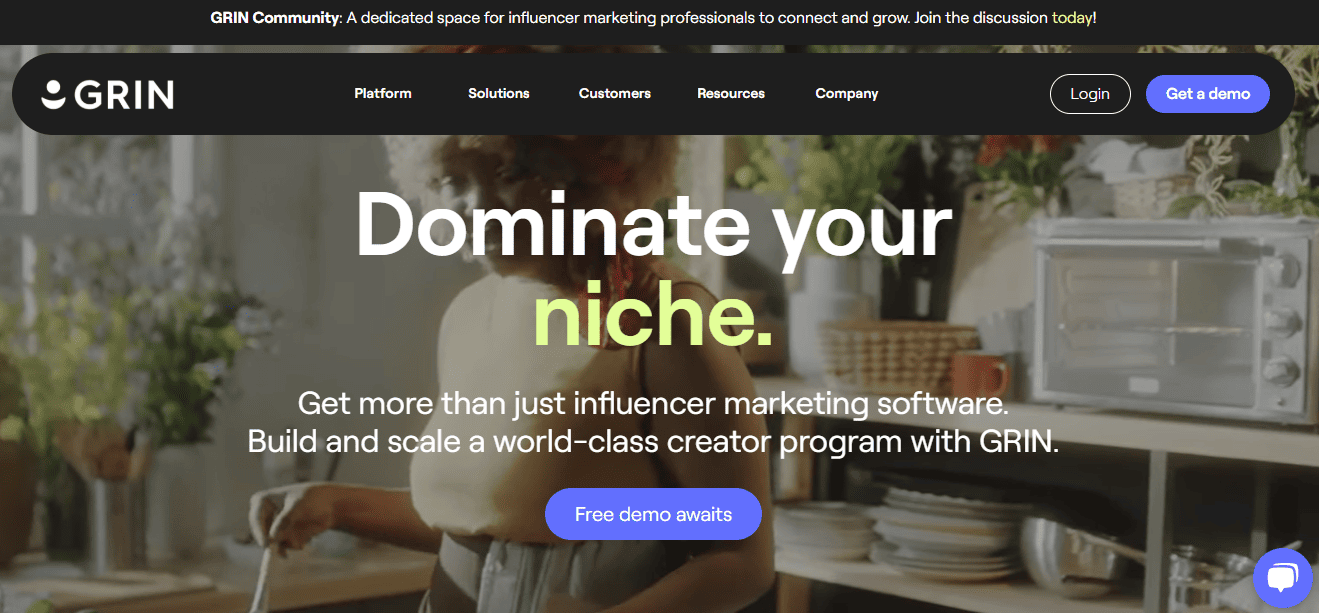
Platform Coverage: Instagram, TikTok, YouTube, X (formerly Twitter), Twitch, and Snapchat.
Pricing: GRIN’s yearly pricing starts at $25.000, with monthly payments available at $2.085/month. No discounts for upfront payments.
Best For: Best suited for DTC brands looking to centralize influencer relationship management in one streamlined system.
Reviews: 4.5/5.0 (G2)
Ease of Use (UX/UI): GRIN offers a smooth and intuitive interface for campaign basics. Larger influencer lists or batch operations can slow down the system.
Customer Support: Onboarding, chat, and email support are available for all tiers, with premium users receiving dedicated strategists. Support quality varies depending on subscription level.
GRIN pricing begins at $2,085/month for monthly payments, higher than Influentials’ €299–€649/month options. Both platforms support multi-channel influencer campaigns, but GRIN emphasizes advanced CRM capabilities, automated workflows, and revenue-linked tracking, whereas Influentials focuses on a verified creator network with simple campaign setup.
Influentials provides 24/7 support and built-in payments for faster execution, while GRIN offers detailed campaign guidance and centralized messaging but is better suited for larger DTC brands. Reporting and analytics are stronger on GRIN, though Influentials’ six months of engagement metrics allow quick validation of creators.
Cost-conscious brands with smaller teams may find Influentials more accessible, while GRIN is ideal for enterprise DTC brands seeking robust CRM, automation, and revenue tracking. Both platforms enable multi-platform campaigns, but the level of automation and pricing differ significantly.
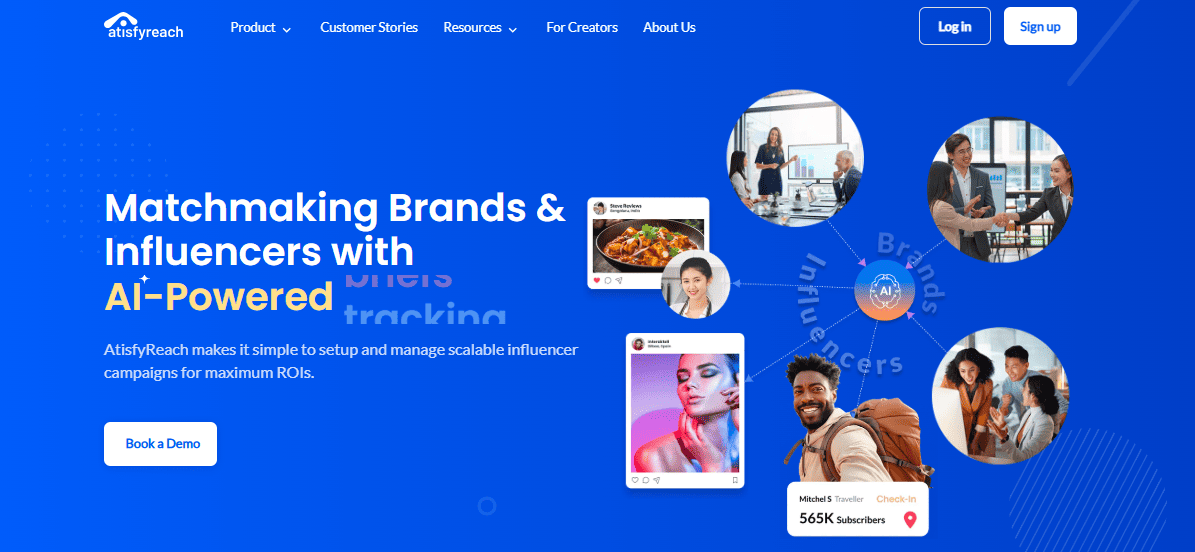
Platform Coverage: Instagram, TikTok, Facebook
Pricing: Free for influencers; brand pricing is custom quote only (not publicly listed)
Reviews: 4.4/5.0 (G2)
Best For: Brands and agencies seeking AI-assisted influencer matching and campaign tracking without a heavy eCommerce stack
Ease of Use (UX/UI): The interface is straightforward for campaign creation and AI-based matching. Advanced analytics and navigation may require a learning curve to fully utilize the platform.
Customer Support: Help is provided via a self-serve Help Center and ticketing system. Users report occasional slower response times, so time-sensitive campaigns require planning.
AtisfyReach offers custom pricing, often undisclosed, which can be higher than Influentials’ transparent €299–€649/month plans. Both platforms support Instagram and TikTok campaigns, but AtisfyReach relies heavily on AI-assisted matching and tracking, whereas Influentials combines a verified creator network with multi-platform UGC campaign management.
Campaign management is simpler on Influentials with built-in payments and automated contracts, while AtisfyReach uses ticket-based support and may have slower responses. Influentials also provides detailed influencer insights and engagement data, whereas AtisfyReach focuses more on AI-driven recommendations and compensation suggestions.
Brands with small teams or limited budgets will likely prefer Influentials for accessibility and ease of use, while AtisfyReach is more suited to those looking for AI-powered matching without a heavy e-commerce stack. The pricing and execution differences make Influentials attractive for fast, hands-on campaigns.
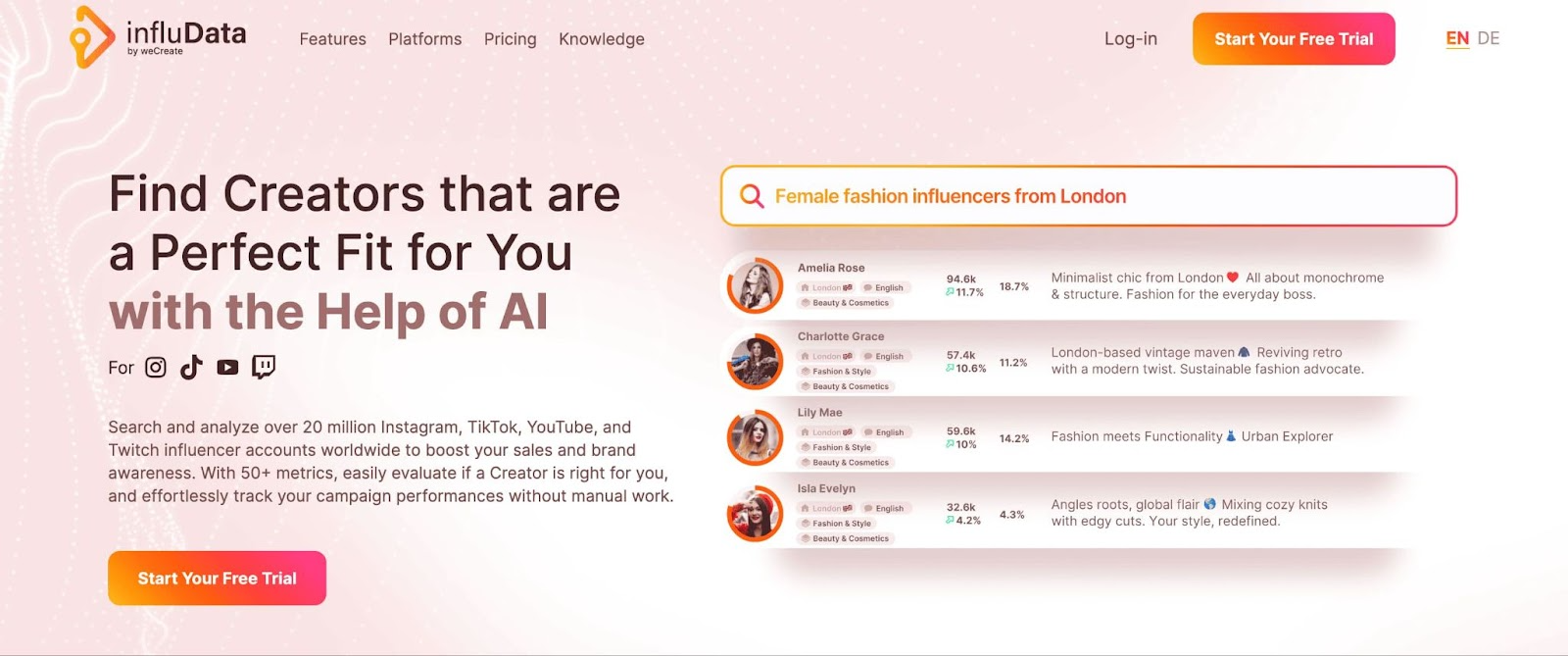
Platform Coverage: InfluData supports Instagram, TikTok, YouTube (including Shorts), and Twitch, providing broad social media reach for mid-sized to enterprise influencer teams.
Pricing: Monthly plans with a one-year minimum contract:
Reviews: 4.6 / 5.0 (Capterra)
Ease of Use (UX/UI): InfluData offers a polished interface with intuitive dashboards that make influencer research straightforward. However, advanced analytics and enterprise-specific functions can feel complex for first-time users.
Customer Support: Users benefit from quick chat and email support, plus extensive documentation, webinars, and onboarding sessions. Higher-tier clients get additional tailored support for smoother integration into workflows.
InfluData pricing starts at €599/month for the Pro plan, comparable to Influentials’ mid-tier Single Brand Plan at €349/month. Both platforms offer Instagram, TikTok, YouTube, and Twitch coverage, but InfluData provides more advanced analytics, social monitoring, and API integration, while Influentials focuses on verified creators, built-in payments, and campaign simplicity.
Influentials streamlines campaign creation via the Campaign Wizard, whereas InfluData emphasizes performance dashboards and competitor-based influencer discovery. Support is robust on both platforms, though Influentials provides 24/7 live chat, email, and phone access compared to InfluData’s tiered support.
For cost-conscious brands prioritizing usability and quick campaign launches, Influentials is ideal, while InfluData is better suited for teams needing enterprise-grade analytics and API integration. The level of technical sophistication differentiates these platforms for different types of users.
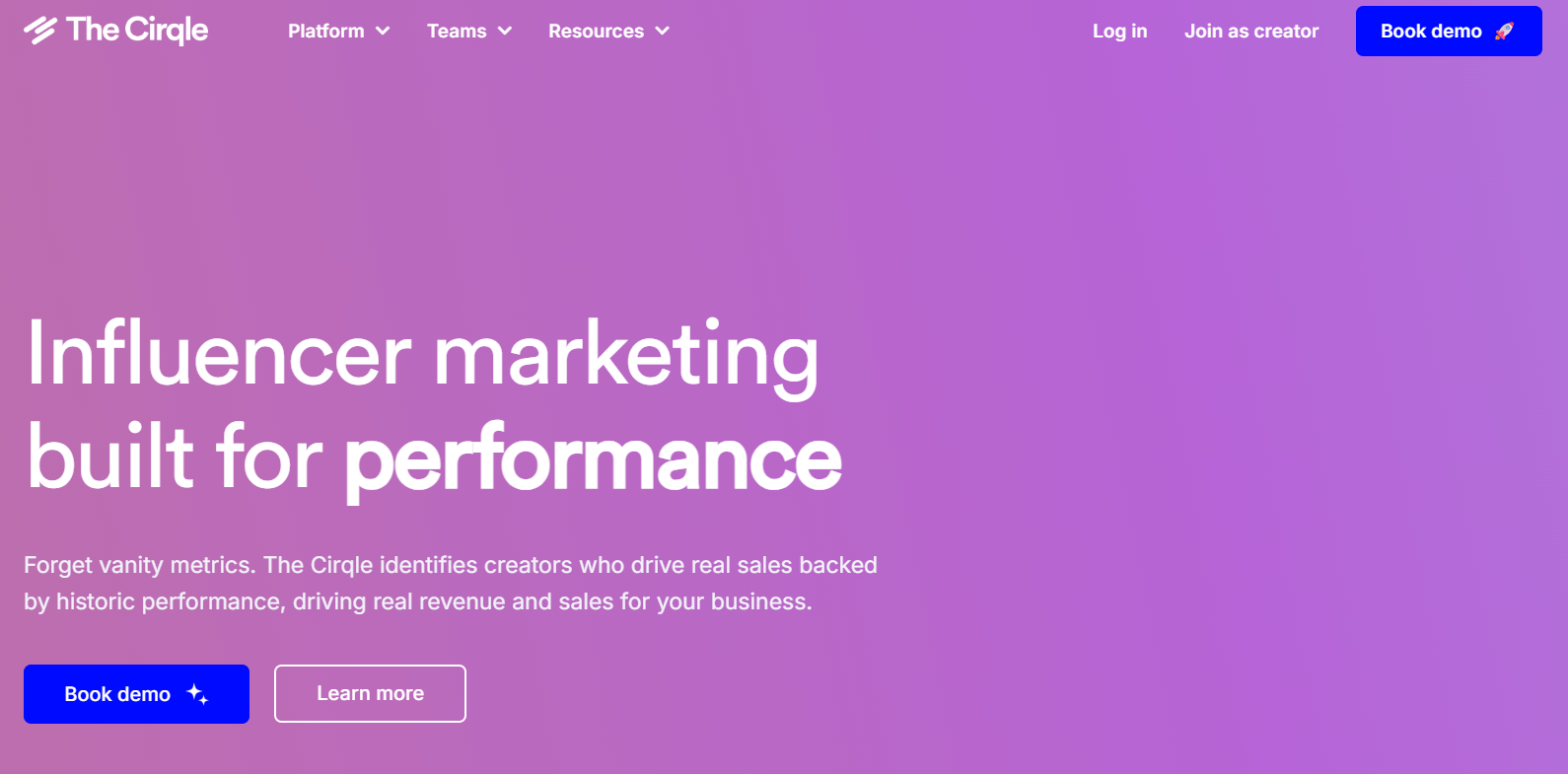
Platform Coverage: The Cirqle supports Instagram, TikTok, and YouTube, focusing on brands running AI-assisted, multi-network influencer programs.
Pricing:
Reviews: 4.2 / 5.0 (G2)
Ease of Use (UX/UI): The Cirqle combines data-rich dashboards with automation features to speed up campaign management. Some advanced AI tools, such as predictive ROAS, require training to use effectively.
Customer Support: Brand-side users report responsive service, especially at higher tiers with 24/7 coverage. Influencers, however, note occasional delays in payments and slower support replies.
The Cirqle pricing starts at €1,000/month for Launch and scales to €4,000/month, higher than Influentials’ €299–€649/month plans. Both platforms support Instagram, TikTok, and YouTube, but The Cirqle emphasizes AI-generated briefs, predictive ROI modeling, and integrated payment management, while Influentials focuses on verified creators and streamlined UGC campaign execution.
Influentials offers built-in payments, contracts, and multi-platform management, whereas The Cirqle automates workflows for briefs, analytics, and payments but may require advanced planning for optimal use. Support is more immediate on Influentials with 24/7 availability, while The Cirqle users report slower influencer payments and relationship tools.
Smaller brands or teams looking for accessible, ready-to-launch campaigns will favor Influentials, while The Cirqle is better suited for brands seeking predictive analytics and AI-driven campaign briefs. The pricing and workflow approach are key differentiators.
If you’re looking for a platform to run influencer campaigns with verified creators, built-in payments, and campaign management across multiple social channels, Influentials provides a solid, accessible foundation. However, some brands may seek solutions with larger creator databases, advanced analytics, AI-powered matching, or enterprise-grade automation.
Among these alternatives, Influencer Hero stands out for teams focused on DTC and eCommerce campaigns—offering AI-driven influencer discovery, CRM, gifting, affiliate tracking, and UGC management in a single intuitive dashboard. Its combination of campaign automation, multi-platform reach, and 24/7 support helps brands scale efficiently while maintaining precise tracking of performance metrics.

Top alternatives include Influencer Hero, Modash, Upfluence, Captiv8, CreatorIQ, HypeAuditor, GRIN, AtisfyReach, InfluData, and The Cirqle. Influencer Hero delivers the most complete all-in-one solution with influencer discovery, AI-assisted outreach, CRM, UGC and affiliate management, and performance analytics.
Influentials excels at cost-effective campaign execution with verified creators and easy payments, but brands needing larger creator pools, deeper analytics, or AI-powered campaign matching may prefer other platforms. Upfluence and Modash provide expanded reach and detailed performance dashboards, while CreatorIQ and GRIN cater to enterprise-level campaign management.
For eCommerce teams, Influencer Hero is a leading choice with Shopify/WooCommerce integrations, gifting, affiliate tracking, and UGC campaign management. GRIN also provides strong eCommerce workflows with revenue-linked CRM, while platforms like Upfluence and Captiv8 offer robust affiliate tracking and large creator networks.
Influentials offers flexible pricing: €299/campaign, €349/month for a single brand, and €649/month for multiple brands, all including a free trial. In contrast, Influencer Hero starts at $649/month, Upfluence and Captiv8 are higher-end solutions for larger teams, and GRIN begins around $25,000/year. Other platforms like HypeAuditor and CreatorIQ also target enterprise budgets.
For an all-in-one approach, Influencer Hero covers discovery, outreach, campaign management, affiliate tracking, UGC collection, and ROI analytics in one platform. While other platforms excel in specific areas—like Modash for influencer vetting or HypeAuditor for fraud detection—Influencer Hero delivers the broadest set of tools for small to mid-sized DTC and eCommerce brands.



Schedule a Demo with one of our media experts below.